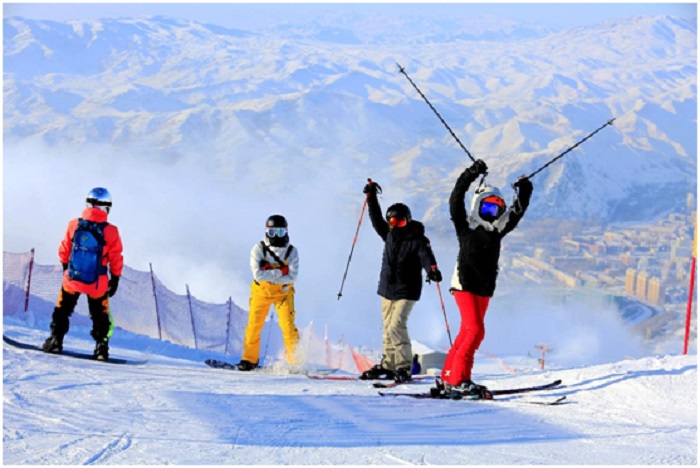



China’s Xinjiang Uygur autonomous region has launched a series of measures to promote the high-quality development of the winter economy over the recent years, making itself a desired destination for more tourists in the winter.
The opener of a ski orienting tournament was held earlier this month at the Silk Road International Ski Resort, Urumqi, capital of Xinjiang. The game just made the prospering winter sports even more attractive.
“We’re seeing more skiers this year,” said Xue Wenjun, vice general manager of the resort. According to him, the resort has been visited by around 1,000 people on a daily basis since this winter, and the number would double on weekends.
Xinjiang has continuously accelerated the construction of tourism infrastructure. On Nov. 24, an international ski resort officially opened in Burqin county in northern Xinjiang. Built in a top-rated scenic area, the resort has perfectly fused the splendid scenery and skiing, and is favored by many ski enthusiasts.
“The resort will be able to accept 30,000 tourists on a daily basis when it is fully completed,” said Wang Lancheng, board director of the company that developed the resort.
So far, Xinjiang has built a total of 66 ski resorts that cover almost all of its prefectures and cities. Some of them have become training bases for national teams of winter sports.
Xinjiang’s Changji Hui autonomous prefecture built 37 standard ice rinks in parks and on lakes, enabling citizens to feel the charm of the sport at their doorsteps.
The booming winter sports sector is also driving the autonomous region’s winter sports equipment manufacturing. The cable cars produced in Xinjiang have been sold to and employed in a number of scenic areas and ski resorts across the country.
“We just sold 1,000 ski suits to a client in Beijing, and the client placed a new order for another 1,000 out of the satisfaction with our products,” said Li Yumei, chairman of board of the Xinjiang Habahe Yaju Beddings and Garments Co., Ltd. Ski suits, ski hats and ski gloves are the major products of the company, whose sales revenue exceeded 20 million yuan ($3.14 million) last year.
Skiing is just a small part of Xinjiang’s sparkling winter tourism. In recent years, the autonomous region has nurtured a batch of distinctive winter tourism destinations and routes that feature local customs and culture.
For instance, Zhaosu county, known as the hometown of one of the best horse breeds in China, has turned itself into an equine tourism area with breathtaking winter views of galloping horses and equestrian performances. Fuhai county is also launching winter fishing activities on its Ulungur Lake every winter to attract tourists.
So far, Xinjiang has held 15 winter tourism trade fairs and 19 Urumqi Silk Road Ice & Snow Festivals. Relevant cultural activities are boosting the development of Xinjiang’s winter tourism. In the first 10 months this year, Xinjiang received 170 million tourists, making tourism revenue of 129.44 billion yuan, up 16.83 percent year on year.
Thanks to the development of winter sports, the people in Xinjiang are seeing their income increasing. In Keketuohai township, Fuyun county, many villagers have opened agritainment facilities, so the winter has become a busy season for them. Kazakh villager Kulparan Habuliqiz has been running a B&B for four years, and the business is bringing her around 200,000 yuan each year. Her daughter works in a nearby ski resort, earning 4,000 yuan on a monthly basis. “Our days are just getting better, and the winter is even more thriving,” she said.


The Executive and members of the.


The Acting Director, FCT Directorate of.


President Bola Ahmed Tinubu has been.



Barely a month after resignation of.


An Abuja based Legal Practitioner, Osuagwu.



Convener of Equitable Remedy, Mrs. Magaret.


Contractors handling the contract for city.


Nigerian government may have concluded plans.


The Diplomatic Correspondents Association of Nigeria.


A rights group, “Follow Me Talk.
Leave a Comment